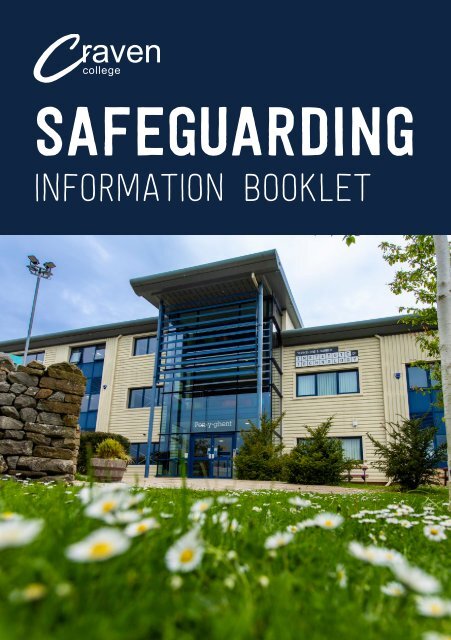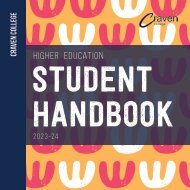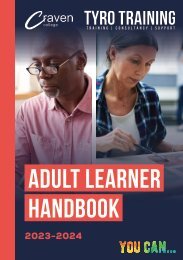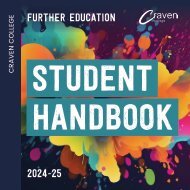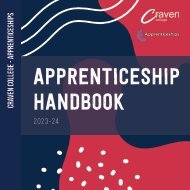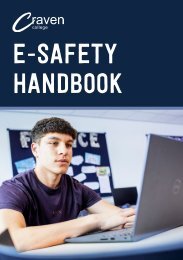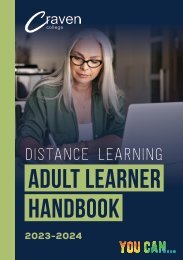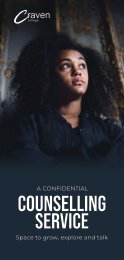Safeguarding info booklet
Create successful ePaper yourself
Turn your PDF publications into a flip-book with our unique Google optimized e-Paper software.
safeguarding<br />
<strong>info</strong>rmation <strong>booklet</strong><br />
1
CONTENTS<br />
Introduction to <strong>Safeguarding</strong><br />
Bullying & Cyber Bullying<br />
Children Going Missing<br />
Child Sexual Exploitation<br />
Domestic Violence & Abuse<br />
Fabricated or Induced Illness<br />
Faith Abuse<br />
Female Genital Mutilation (FGM)<br />
Forced Marriage<br />
Gangs & Youth Violence<br />
Gender Based Violence Against Women<br />
Homelessness<br />
Mental Health<br />
Online Safety<br />
Personal Safety<br />
Prevent<br />
United Values<br />
Run. Hide. Tell<br />
Sexual Violence & Sexual Harassment<br />
Hate Crime<br />
Sexting<br />
Substance Misuse<br />
Teenage Relationship Abuse<br />
Child on Child Abuse<br />
Upskirting - A Criminal Offence<br />
Trafficking<br />
Reporting <strong>Safeguarding</strong> Issues<br />
College Contacts<br />
Websites & Helplines<br />
3<br />
4<br />
5<br />
6<br />
7<br />
8<br />
9<br />
10<br />
11<br />
12<br />
13<br />
14<br />
15<br />
16<br />
17<br />
18<br />
19<br />
20<br />
21<br />
22<br />
23<br />
25<br />
26<br />
27<br />
27<br />
28<br />
29<br />
30<br />
32<br />
2
Introduction to <strong>Safeguarding</strong><br />
What does <strong>Safeguarding</strong> mean?<br />
<strong>Safeguarding</strong> is the action taken to<br />
promote the welfare of children and<br />
protect them from harm.<br />
<strong>Safeguarding</strong> means:<br />
• Protecting children from abuse and<br />
maltreatment<br />
• Preventing harm to children’s health<br />
or development<br />
• Ensuring children grow up with the<br />
provision of safe and effective care<br />
• Taking action to enable all children<br />
and young people to have the best<br />
outcomes<br />
Child protection is part of the<br />
safeguarding process. It focuses on<br />
protecting individual children identified<br />
as suffering or likely to suffer significant<br />
harm. This includes child protection<br />
procedures which detail how to respond<br />
to concerns about a child.<br />
Craven College is committed to<br />
providing a safe and welcoming<br />
environment in which to work and learn.<br />
<strong>Safeguarding</strong> involves keeping children,<br />
young people and adults safe from a<br />
wide range of potential harm.<br />
How does Craven College keep<br />
students safe?<br />
There are several ways in which<br />
the College ensures the safety and<br />
wellbeing of its students and staff:<br />
• Ensuring IDs are always worn by staff<br />
and students<br />
• Advice about healthy lifestyles during<br />
group tutorials<br />
• Learning Mentors and Progress<br />
Coaches who can support and advise<br />
in 1-1 tutorials<br />
• Regular staff training so that staff feel<br />
confident and safe when supporting<br />
young people<br />
• All permanent members of staff are<br />
DBS (Disclosure and Barring Service)<br />
checked and received a robust<br />
induction<br />
• Student Support Services can help<br />
with a wide range of pastoral issues<br />
• Counselling Service<br />
The advice that follows in this <strong>booklet</strong><br />
covers specific safeguarding issues<br />
which may affect you, or someone<br />
you know during your time at College,<br />
or that may have affected you in the<br />
past. If you feel worried, confused, or<br />
upset by any of the <strong>info</strong>rmation do not<br />
hesitate to talk to your Learning Mentor<br />
or Progress Coach or any member of<br />
the Student Support Services Team.<br />
A number of helplines are listed on<br />
MyCraven.<br />
The safeguarding <strong>info</strong>rmation in<br />
this <strong>booklet</strong> relates to the document<br />
updated by the Department for<br />
Education in September 2022 entitled<br />
‘Keeping Children Safe in Education’<br />
which contains statutory guidance for<br />
schools and colleges.<br />
3
Bullying & Cyber Bullying<br />
What is bullying?<br />
Bullying can take many different forms<br />
and can be physical or emotional.<br />
It involves one individual, or group<br />
deliberately hurting or upsetting<br />
another individual or group.<br />
Cyber bullying involves someone being<br />
bullied by email, instant messaging,<br />
social media websites (such as<br />
Facebook/Instagram/Twitter etc)<br />
or text messages. It could be that<br />
someone is writing nasty or upsetting<br />
comments about you or perhaps<br />
uploading embarrassing photographs<br />
or videos. Being bullied can make you<br />
feel lonely and depressed, and you may<br />
start avoiding social situations or feel<br />
like you do not want to come to College.<br />
Who can help?<br />
Learning Mentors, Progress Coach,<br />
trusted member of staff or Student<br />
Services.<br />
www.bullying.co.uk<br />
www.thinkuknow.co.uk<br />
www.ceop.police.uk<br />
Childline: 0800 1111<br />
The Samaritans: 116 123 for<br />
confidential advice and support.<br />
In some situations, the police may need<br />
to be involved.<br />
What should I do if I’m being bullied?<br />
Craven College has a zero tolerance<br />
to bullying and incidents should be<br />
reported so they can be dealt with<br />
quickly and effectively. It can be difficult<br />
to ask for help but if you talk to your<br />
tutor, a trusted member of staff or<br />
Student Services they can help and<br />
support you and ensure the issue is<br />
tackled.<br />
You may also want to call one of the<br />
helpline numbers or go to one of the<br />
websites where you can receive advice<br />
and support online. If you are being<br />
bullied online or via text messages, it is<br />
really important not to respond to the<br />
messages. You should save them or<br />
take a screen shot so you have a record<br />
of what has happened and report it as<br />
soon as you can. Many websites have<br />
a ‘report abuse’ button so that on-line<br />
bullies can be dealt with.<br />
4
Children going Missing<br />
(From Education, Home, or Care)<br />
All young people, regardless of their<br />
circumstances, are entitled to a fulltime<br />
education which is suitable to their<br />
age, ability, aptitude, and any special<br />
educational needs they may have.<br />
A student going missing from<br />
education, home or care is a potential<br />
indicator of abuse or neglect. College<br />
staff follow the college’s procedures<br />
for students that goes missing from<br />
education, particularly on repeat<br />
occasions.<br />
Who can help?<br />
Learning Mentors, Progress Coach,<br />
trusted member of staff or Student<br />
Services.<br />
If you are concerned about a young<br />
person, you can also call the NSPCC 24<br />
hour helpline on 0808 800 5000 or<br />
text 88858.<br />
They help to understand the need, to<br />
identify the risk of abuse and neglect,<br />
including sexual exploitation, and to<br />
help prevent the risks of their going<br />
missing in future. This is why the College<br />
has strict attendance policies and will<br />
follow up on all absences.<br />
5
Child Sexual Exploitation<br />
What is child sexual exploitation?<br />
Child sexual exploitation is a situation<br />
where a young person, under the age<br />
of 18 is being pressured or forced into<br />
a sexual relationship with someone<br />
else because that person is giving them<br />
something in return. It could be that<br />
the young person is receiving money,<br />
food, drugs, housing, gifts or even just<br />
affection in return for sex.<br />
How does it happen?<br />
It could be that an older person has<br />
spent a long time getting to know a<br />
young person, in order to then initiate a<br />
sexually exploitative relationship, often<br />
making them feel special by giving them<br />
gifts or lots of attention– this process is<br />
known as ‘grooming.’<br />
Who can help?<br />
Learning Mentors, Progress Coach,<br />
trusted member of staff or Student<br />
Services.<br />
In an emergency call 999<br />
Childline: 0800 1111<br />
If you are concerned about a young<br />
person, you can also call the NSPCC<br />
24-hour helpline on 0808 800 5000<br />
or text 88858.<br />
Even if someone says they care about<br />
you and sometimes makes you feel<br />
really good, it is wrong for them to<br />
make you feel upset or frightened and it<br />
is wrong for them to try and control you<br />
or pressurise you.<br />
Who does it happen to?<br />
Sexual exploitation can happen to<br />
anyone, boys, or girls and sometimes<br />
it can be difficult to know when you<br />
are being exploited. It might feel like<br />
someone is being really nice to you, but<br />
that does not mean that they are not<br />
going to end up doing something bad.<br />
Being sexually exploited in this way is<br />
never the fault of the young person<br />
and there are lots of ways in which you<br />
can get help if you find yourself in this<br />
situation.<br />
6
Domestic Violence & Abuse<br />
What is domestic violence and abuse?<br />
Domestic violence is abuse which takes<br />
place between two people over 16 who<br />
are in an intimate relationship together<br />
or are family members.<br />
The abuse can take many forms<br />
including Psychological, Physical,<br />
Sexual, Financial and Emotional abuse.<br />
Domestic abuse can happen to<br />
anyone, no matter what your gender<br />
or sexuality, and it may not always or<br />
exclusively involve violence i.e. being hit,<br />
punched, or kicked. It could be that your<br />
partner or a family member threatens<br />
you, shoves or pushes you or makes you<br />
feel scared or frightened. They may act<br />
in a very possessive or jealous way and<br />
try to control what you do and where<br />
you go, or make you feel bad about<br />
yourself by insulting you and making<br />
hurtful remarks.<br />
Who can help?<br />
Learning Mentors, Progress Coach,<br />
trusted member of staff or Student<br />
Services.<br />
In an emergency call 999<br />
National Domestic Violence Freephone<br />
helpline open 24 hours 0800 970<br />
2070 or text 60777<br />
National Centre for Domestic Violence<br />
www.ncdv.org.uk or 0844 8044 999<br />
Men’s Advice:<br />
<strong>info</strong>@mensadviceline.org.uk or 0808<br />
801 0327<br />
What to do if it happens to you<br />
It can be difficult to tell someone that<br />
you are experiencing domestic violence.<br />
It may be that you feel it is your fault or<br />
that your loved one is going through a<br />
bad time and things will soon change.<br />
However, this form of abuse is serious<br />
and if it happens to you, it is really<br />
important that you tell someone so that<br />
you can get help.<br />
It is important to seek help before you<br />
find yourself in an emergency situation<br />
when abuse has escalated. You must<br />
remember that it is not your fault and<br />
that you are not alone.<br />
7
Fabricated or Induced Illness<br />
What is fabricated or induced illness?<br />
There is a rare form of abuse known<br />
as fabricated/induced illness which<br />
is also sometimes referred to as<br />
‘Munchausen’s by proxy.’ This involves<br />
a caregiver (usually a parent)<br />
pretending that their son or daughter<br />
is ill or faking or inducing symptoms of<br />
illnesses. This may take the form of a<br />
carer convincing their child they feel<br />
ill when they are in fact healthy, using<br />
poisonous substances to induce illness,<br />
faking medical test results or medical<br />
history and records or exaggerating or<br />
inventing symptoms.<br />
Who can help?<br />
Learning Mentors, Progress Coach,<br />
trusted member of staff or Student<br />
Services.<br />
Childline 0800 1111<br />
If you are worried about a child, contact<br />
the NSPCC www.nspcc.org or call their<br />
24-hour helpline on 0808 800 5000<br />
A parent or carer will usually seek<br />
medical help and their child may receive<br />
unnecessary medical treatment.<br />
Fabricated or induced illness is equally<br />
common with boys and girls.<br />
Why does it happen?<br />
The motivation for carers who fabricate<br />
illness in their children is unclear, but<br />
often the perpetrators have an<br />
underlying personality disorder or other<br />
mental health issues.<br />
Victims of fabricated or induced illness<br />
can develop long term health problems,<br />
both physically and emotionally.<br />
8
Faith Abuse<br />
What is faith abuse?<br />
Faith abuse is a type of abuse linked to<br />
faith, religion, or belief.<br />
The belief in witchcraft, possession<br />
and supernatural forces can result in<br />
extremely serious cases of child abuse.<br />
When faith abuse happens, adults may<br />
believe that a child has been possessed<br />
by the devil or that they are a witch<br />
and this may be used to explain any<br />
behaviour which the adult disapproves<br />
of.<br />
Who can help?<br />
Learning Mentors, Progress Coach,<br />
trusted member of staff or Student<br />
Services.<br />
Childline 0800 1111<br />
Children & Families Across Borders<br />
CFAB.org.uk or advice line:<br />
020 7735 8941<br />
If you are worried about a child, contact<br />
the NSPCC www.nspcc.org or call their<br />
24-hour helpline on 0808 800 5000<br />
There may be attempts to ‘cure’ or<br />
punish the child which then furthers the<br />
abuse. Children with disabilities can be<br />
at an increased risk and the abuse may<br />
come from one individual, but wider<br />
family members, communities and faith<br />
leaders may also be involved.<br />
Abuse may be physical, emotional,<br />
sexual or may take the form of neglect.<br />
Is it illegal?<br />
Faith abuse is a crime. Although<br />
everyone’s religion, culture and beliefs<br />
should be respected, beliefs that lead<br />
to abuse cannot be tolerated.<br />
If this issue has affected, you or<br />
someone you know it is important to<br />
seek help.<br />
9
Female Genital Mutilation (FGM)<br />
What is female genital mutilation?<br />
Female genital mutilation (FGM)<br />
comprises all procedures that involve<br />
partial or total removal of the external<br />
female genitalia, or other injury to the<br />
female genital organs for non-medical<br />
reasons. It is estimated that between<br />
100-140 million women and girls have<br />
been subjected to FGM.<br />
Official WHO (World Health<br />
Organisation) FGM is illegal in the UK<br />
and must be reported.<br />
Why does it happen?<br />
FGM is cruel and harmful. There are<br />
a number of reasons used to justify it<br />
which include motives such as culture,<br />
religious beliefs, tradition and hygiene.<br />
Although different beliefs should be<br />
respected, beliefs which lead to abuse<br />
cannot be tolerated.<br />
Female genital mutilation can lead<br />
to short term consequences such<br />
as pain, shock, infection, and fatal<br />
haemorrhaging as well as long term<br />
problems such as a severely damaged<br />
reproductive system, repeated<br />
infections, and psychological trauma.<br />
Who can help?<br />
If you or someone you know has<br />
been affected by this issue, it’s really<br />
important to tell someone so that<br />
they can help you cope with the<br />
consequences. There are specialist<br />
clinics which can help with the physical<br />
and psychological effects of FGM.<br />
If you are concerned that your family<br />
may intend this for you or another<br />
family member, then you must tell<br />
someone as soon as possible.<br />
Learning Mentors, Progress Coach,<br />
trusted member of staff or Student<br />
Services.<br />
Childline 0800 1111<br />
FORWARD is an African Diaspora<br />
women led UK- registered campaign<br />
and support charity dedicated to<br />
advancing and safeguarding the sexual<br />
and reproductive health and rights of<br />
African girls and women<br />
www.forwarduk.org.uk<br />
If you are worried about a child, contact<br />
the NSPCC www.nspcc.org or call their<br />
24-hour helpline on 0808 800 5000.<br />
10
Forced Marriage<br />
What is forced marriage?<br />
Everyone has the right to choose who<br />
they marry, when they marry and if they<br />
get married at all. A forced marriage<br />
is one where one or both spouses do<br />
not want to get married but are doing<br />
so because they are being pressured,<br />
intimidated, or forced to do so.<br />
The pressure to get married will<br />
usually come from parents and other<br />
family members and may be physical,<br />
emotional, psychological, sexual, and<br />
financial.<br />
Victims may be told they will bring<br />
shame on their family if they do not go<br />
ahead with the marriage, and this can<br />
be very intimidating. In June 2014, a<br />
new law was passed which means that<br />
forcing someone to get married is now<br />
an offence and can result in a prison<br />
sentence of up to seven years.<br />
Forced marriage involving anyone<br />
under the age of 18 constitutes a form<br />
of child abuse.<br />
Who can help?<br />
Learning Mentors, Progress Coach,<br />
trusted member of staff or Student<br />
Services.<br />
Childline 0800 1111<br />
The Forced Marriage Unit can offer<br />
advice and practical help about how<br />
to stop a forced marriage or how to<br />
get out of a marriage you have been<br />
forced into. They can also help if you<br />
are worried you will be taken out of the<br />
country to be married.<br />
www.gov.uk/stop-forced-marriage<br />
www.freedomcharity.org.uk<br />
If you are in danger of immediate harm<br />
or are about to be taken out of the<br />
country for a forced marriage, call 999.<br />
Is it the same as arranged marriage?<br />
No. In an arranged marriage, a family<br />
will choose a possible spouse but<br />
both partners will be involved in the<br />
decision-making process and have the<br />
right to say no if they do not want to go<br />
ahead with the marriage.<br />
11
Gangs & Youth Violence<br />
Who gets involved in gangs?<br />
Most young people never get involved<br />
in gangs or violence. However, there are<br />
some individuals, both male and female<br />
who are vulnerable to this and it can<br />
result in them being harmed or harming<br />
other people.<br />
Many young people involved in gangs<br />
and violent behaviour are victims of<br />
crimes as well as offenders. Being<br />
involved in a gang can involve violence,<br />
sexual exploitation, weapons, drugs,<br />
and criminal activity.<br />
Why do people join gangs?<br />
People get involved with gangs for<br />
several reasons. These can include<br />
wanting to be respected, to feel they<br />
belong, to make money, boredom,<br />
feeling protected and because other<br />
friends and family are already involved.<br />
Although, it can sometimes feel you<br />
have no choice but to get involved or<br />
feel there is no way out.<br />
Who can help?<br />
If you are involved in a gang or are<br />
being pressurized into joining, there are<br />
a number of ways in which you can get<br />
help:<br />
Learning Mentors, Progress Coach,<br />
trusted member of staff or Student<br />
Services.<br />
Childline 0800 1111<br />
If you are worried about a child, contact<br />
the NSPCC on www.nspcc.org or call<br />
their 24-hour helpline on 0808 800<br />
5000<br />
A number of other agencies can offer<br />
support: the local authority, local police<br />
and Youth Offending Team.<br />
Being involved in a gang can mean<br />
you are unable to have the freedom<br />
to do what you want and you may feel<br />
pressurised or be threatened to do<br />
things you do not want to do<br />
What are the consequences?<br />
Being involved in a violent gang can<br />
have serious long- term consequences<br />
for you. Members of gangs involved<br />
in illegal activity will face criminal<br />
prosecution.<br />
12
Gender Based Violence Against Women<br />
What is gender based violence against<br />
women?<br />
This term is used to describe violence<br />
and abuse that is specifically targeted<br />
towards women. It includes rape and<br />
sexual violence, domestic abuse, female<br />
genital mutilation and forced marriage.<br />
Sometimes women experience violent<br />
behaviour from strangers, but they<br />
may also be the victims of violence<br />
from people they know or are in a<br />
relationship with.<br />
Domestic and sexual violence often<br />
takes place behind closed doors and<br />
women may suffer in silence, feeling<br />
too frightened or ashamed to tell<br />
anyone, but the women involved are<br />
not responsible for the violence being<br />
inflicted upon them and should seek<br />
help in order to end it.<br />
Who can help?<br />
Learning Mentors, Progress Coach,<br />
trusted member of staff or Student<br />
Services.<br />
Refuge is a charity which supports<br />
women who are the victims of domestic<br />
violence and they run a free 24-hour<br />
helpline: 0808 2000 247 or visit<br />
www.refuge.org.uk<br />
www.womensaid.org.uk<br />
www.rapecrisis.org.uk<br />
www.forwarduk.org.uk<br />
(Female genital mutilation)<br />
www.freedomcharity.org.uk<br />
(Forced marriage)<br />
How can it be stopped?<br />
There is a lot of support available to<br />
help women who are the victims of<br />
violence. The first step is to talk to<br />
someone if this is something which is<br />
happening to you. In March 2014, a new<br />
law known as the Domestic Violence<br />
Disclosure Scheme or ‘Clare’s Law’ was<br />
introduced which allows individuals<br />
to check with the police to find out if<br />
their partner has a history of domestic<br />
violence.<br />
13
Homelessness<br />
Are you Homeless, sofa surfing or at<br />
risk?<br />
There are lots of reasons why young<br />
people become homeless. Relationship<br />
breakdown, usually between young<br />
people and their parents (or stepparents),<br />
it is a major cause of youth<br />
homelessness, this can be due to<br />
arguments, relationship breakdown or<br />
being told to leave.<br />
Everyone deserves a safe and stable<br />
place to live. The housing system can<br />
be confusing, but there is help out there<br />
and you do not have to wait until you<br />
are on the streets before you can get it.<br />
Who can help?<br />
Learning Mentors, Progress Coach,<br />
trusted member of staff or Student<br />
Services.<br />
The Centrepoint Helpline can give you<br />
help with housing if you are at risk<br />
of becoming homeless or do not feel<br />
safe in your home; 0808 800 0661<br />
(Monday-Friday, 9am-5pm).<br />
They have also created these guides to<br />
help you find the right support:<br />
centrepoint.org.uk/do-you-need-help<br />
14
Mental Health<br />
What is mental health?<br />
Mental health is also referred to as<br />
emotional health or wellbeing and it<br />
is just as important as your physical<br />
health. Good mental health does not<br />
just mean that you do not have any<br />
mental health problems. It should mean<br />
that you are able to positively engage<br />
in all aspects of your life, including<br />
college, friends and family and your<br />
leisure time. You should be able to cope<br />
with everyday problems and fulfil your<br />
potential, however, everyone reacts to<br />
challenges and difficulties in their lives<br />
differently. Some people find it easy to<br />
manage their emotions and problems,<br />
others may find it harder and need<br />
support.<br />
There are several mental health<br />
problems and some of the more<br />
common ones include:<br />
• Depression<br />
• Anxiety and panic attacks<br />
• Self-harm Suicidal thoughts and<br />
feelings<br />
• Phobias<br />
• Eating disorders Obsessive<br />
Compulsive Disorder (OCD)<br />
Who can help?<br />
Learning Mentors, Progress Coach,<br />
trusted member of staff or Student<br />
Services and the College Counselling<br />
team. Your GP will support you and<br />
refer you when necessary.<br />
First Response crisis service offers<br />
support 24/7 to people of all ages living<br />
in Airedale, Wharfedale or Craven<br />
experiencing a mental health crisis –<br />
0800 952 1181<br />
Mental Health Matters Helpline 0800<br />
107 0160 free support from trained<br />
staff 24 hours a day.<br />
General mental health issues:<br />
www.mind.org<br />
www.youngminds.org.uk<br />
Anxiety and panic advice<br />
www.anxietyuk.org.uk<br />
Eating Disorders support<br />
www.beatingdisorders.co.uk<br />
What to do if you are worried about<br />
your mental health<br />
Some people feel embarrassed talking<br />
about their mental health or see it as<br />
a sign of failure or weakness. However,<br />
mental health issues are very common<br />
and with the right support most people<br />
learn to manage their difficulties and<br />
live a happy fulfilling life. Talking about<br />
how you feel is the first step and will<br />
lead you to getting the support you<br />
need.<br />
15
Online Safety<br />
What is online safety?<br />
Online safety involves making sure<br />
young people are safe and secure when<br />
they are using the internet. It includes<br />
mobile phones, games consoles,<br />
wireless technology, and social<br />
networking.<br />
The internet can be a great way of<br />
staying in touch with friends and can be<br />
used in a number of ways to help you<br />
learn while you are at College but it is<br />
really important that you understand<br />
the risks and know how to use it safely<br />
and responsibly.<br />
If you encounter anything online which<br />
is worrying or upsetting, make sure you<br />
tell someone or report it via a ‘report<br />
abuse’ or CEOP button or using one of<br />
the support websites or helplines.<br />
How can I stay safe online?<br />
• Remember, you cannot trust<br />
everything you read/see on the<br />
internet<br />
• Not everyone is who they say they are<br />
online<br />
• Do not meet up with people you have<br />
only ever met online<br />
• You have the right to keep <strong>info</strong>rmation<br />
private, you do not have to tell people<br />
things if you do not want to<br />
• Be cautious when filling out online<br />
forms and questionnaires<br />
• Pictures, messages & videos are out of<br />
your control once they are online<br />
• If upsetting pictures or messages of<br />
you or about you are posted, you have<br />
the right to report them and ask for<br />
them to be removed<br />
• Inappropriate behaviour and online<br />
(cyber) bullying should be reported<br />
immediately<br />
• Always use respectful and<br />
appropriate language and behaviour<br />
online. Anything which is upsetting, or<br />
offensive should be reported<br />
How do I report problems?<br />
Most social networking sites and a<br />
number of other websites have a<br />
button you click to report abuse or<br />
inappropriate behaviour.<br />
If you are being sent offensive images<br />
or messages, do not respond. You can<br />
take a screenshot of an inappropriate<br />
message and report it.<br />
Who can help?<br />
Learning Mentors, Progress Coach,<br />
trusted member of staff or Student<br />
Services.<br />
www.ceop.police.uk<br />
www.thinkuknow.com<br />
Childline 0800 1111<br />
The Online Safety Handbook is<br />
available on Moodle and has more<br />
advice on online safety.<br />
Your responsibilities are to keep<br />
yourself safe and to respect other<br />
people’s rights to safety.<br />
16
Personal Safety<br />
Personal safety is important when<br />
taking part in any kind of learning.<br />
Everyone has the right to be and feel<br />
safe.<br />
Your responsibilities are to keep<br />
yourself safe and to respect other<br />
people’s rights to safety.<br />
Top Tips for Personal Safety<br />
• When you go out make sure someone<br />
knows where you are going, who you<br />
are meeting and when you expect to<br />
return<br />
• Personal alarms are available form<br />
Student Services<br />
• Avoid using your phone for long<br />
periods or listening to music when you<br />
are out as this can make you less alert<br />
to danger<br />
Useful links:<br />
Spiking – how to protect yourself on a<br />
night out:<br />
www.talktofrank.com/news/spiking<br />
• Always make plans for your journey<br />
home in advance<br />
• When out at night, stick to busy, welllit<br />
areas<br />
• Walk facing on-coming traffic<br />
• Keep your valuables in a cross- thebody<br />
bag and keep it zipped up<br />
• Ensure you have an ‘ICE’ (In Case of<br />
Emergency) number in your mobile<br />
phone<br />
• Remember– alcohol can reduce your<br />
awareness, judgement and can affect<br />
your ability to make safe and sensible<br />
decisions<br />
• Know your safe limits when drinking<br />
alcohol and make sure you stay with<br />
your friends and keep an eye on their<br />
safety too<br />
• Do not meet up with people you have<br />
only ever met online. You do not know<br />
if you can trust them and if they are<br />
who they say they are<br />
17
Prevent<br />
What is Prevent?<br />
Prevent is a Government programme<br />
which helps to safeguard young people<br />
and vulnerable adults from being<br />
drawn towards supporting extremism<br />
or terrorism. It aims to protect people<br />
from exploitation by radical groups or<br />
acting in extreme ways.<br />
The Prevent Duty is not about<br />
preventing students from having<br />
political and religious views and<br />
concerns but about supporting them to<br />
use those concerns or act on them in a<br />
non-extremist way.<br />
What is Radicalisation?<br />
Radicalisation is the process by which<br />
a person comes to support terrorism<br />
or the forms of extremism which<br />
can lead to terrorism. Extremists or<br />
extremist organisations may try to<br />
take advantage of young people and<br />
vulnerable adults as a way to share<br />
their message and view with others.<br />
Exploitation of young people and<br />
vulnerable adults into this position is a<br />
form of grooming.<br />
What is Extremism?<br />
There are certain forms of extreme<br />
behaviour which are illegal and call for<br />
violence against others, incite hatred or<br />
try to inspire acts of terrorism.<br />
Exposure to violent extremism or<br />
extremist material is a significant<br />
safeguarding concern and we will<br />
always challenge this.<br />
COMBATING<br />
TERRORISM<br />
REDUCING<br />
RADICALISATION<br />
TACKLING<br />
EXTREMISM<br />
18
United Values<br />
At Craven College we believe in<br />
creating an ethos that promotes<br />
‘United Values’ at every level.<br />
• Democracy<br />
• Individual liberty<br />
• The rule of Law<br />
• Mutual Respect and tolerance<br />
• Equity<br />
We are dedicated to promoting these<br />
values to ensure our learners develop<br />
a strong sense of social and moral<br />
responsibility, become well- rounded<br />
individuals, are respectful to others and<br />
are able to contribute effectively to the<br />
wider community.<br />
Who can I talk to?<br />
If you feel you are being drawn into<br />
Craven College promotes<br />
a group with extreme ideas or are<br />
being pressurised to get involved with<br />
a group, talking through how you are<br />
united values<br />
feeling can help you get a different<br />
perspective. If you feel that someone<br />
you know is at risk of becoming involved<br />
in an extremist group it is also<br />
important to tell someone about this.<br />
The local authority and local police can<br />
help support you and offer <strong>info</strong>rmation<br />
and advice.<br />
Who can help?<br />
Learning Mentors, Progress Craven College Coach, promotes<br />
trusted member of staff or Student<br />
Services.<br />
Police (non-emergency) 101<br />
united val<br />
www.met.police.uk/advice/adviceand-<strong>info</strong>rmation/t/terrorism-inthe-uk/signs-of-possible-terroristactivity/<br />
UNDERSTANDING AND<br />
Anti-Terrorist Hotline on 0800 789 321<br />
RESPECT OF LAW<br />
No one is above the law<br />
NUR<br />
Challe<br />
UNDERSTANDING AND<br />
RESPECT OF LAW<br />
NURTURE MUTUAL<br />
RESPECT<br />
INDIVIDUAL<br />
LIBERTY<br />
TOLERANCE OF OTHERS<br />
FAITHS & BELIEFS<br />
No one is above the law<br />
Challenging discriminating<br />
behaviour<br />
Freedom of speech<br />
All backgrounds, cultures,<br />
religions and beliefs<br />
Fa<br />
KEEPING OUR<br />
VOTE<br />
VOTE<br />
TOLERANCE OF OTHERS<br />
FAITHS & BELIEFS<br />
EQUITY<br />
DEMOCRACY<br />
You have the rig<br />
All backgrounds, cultures,<br />
religions and beliefs<br />
Fairness and justice<br />
Your opinion counts<br />
If you have any concern<br />
member of the Safeguar<br />
19
RUN. HIDE. TELL<br />
Below is the official Counter Terrorism Policing Teams advice as to what to do in<br />
the unlikely event of being caught up in a situation where you are fearful for your<br />
safety.<br />
It only takes 4 minutes to watch but may just save your life. We encourage all our<br />
students to watch it.<br />
www.youtube.com/watch?v=QUCW_mk35Xc<br />
RUN<br />
to a place of safety. This is a far better option than to surrender or negotiate. If<br />
there is nowhere to go, then…<br />
HIDE<br />
It is better to hide than to confront. Remember to turn your phone to silent and<br />
turn off vibrate. Barricade yourself in if you can. Then finally and only when it is<br />
safe to do so…<br />
TELL<br />
the police by calling 999.<br />
If you have seen or heard something that could suggest a terrorist threat to the<br />
UK, report it at The Metropolitan Police website www.met.police.uk using their<br />
quick and confidential online tool under Tell Us About. They monitor this service 24<br />
hours a day.<br />
The Met hosts this reporting service on behalf of all UK police forces.<br />
20
Sexual Violence & sexual harassment<br />
What is Sexual Violence?<br />
Sexual violence is any kind of sexual<br />
activity or act (including online) that<br />
was unwanted or involved one or more<br />
of the following:<br />
• Pressure<br />
•Manipulation<br />
• Bullying<br />
• Intimidation<br />
• Threats<br />
• Deception<br />
• Force<br />
In other words, any kind of sexual<br />
activity or act that took place without<br />
consent.<br />
What is Sexual Harassment?<br />
Behaviour from one person to another<br />
is characterized by the making of<br />
unwelcome and inappropriate sexual<br />
remarks or physical advances in a<br />
workplace or other professional or<br />
social situation.<br />
What to do if this is happening to you?<br />
If you have been sexually assaulted, it is<br />
important to remember that it was not<br />
your fault. Sexual violence is a crime,<br />
no matter who commits it or where it<br />
happens. Do not be afraid to get help.<br />
as possible for any injuries and because<br />
you may be at risk of pregnancy or<br />
sexually transmitted infections (STIs).<br />
www.nhs.uk/conditions/sexuallytransmitted-infections-stis/<br />
If you want the crime to be investigated,<br />
the sooner a forensic medical<br />
examination takes place, the better.<br />
Try not to wash or change your clothes<br />
immediately after a sexual assault.<br />
This may destroy forensic evidence<br />
that could be important if you decide to<br />
report the assault to the police.<br />
Who can help?<br />
Learning Mentors, Progress Coach,<br />
trusted member of staff or Student<br />
Services.<br />
Supporting victims in North Yorkshire:<br />
Sexual Abuse Support Services | North<br />
Yorkshire:<br />
www.supportingvictims.org/supportservices/sexual-abuse/<br />
Supporting people who have suffered<br />
domestic violence and sexual violence.<br />
There are services that can help if you<br />
have been sexually assaulted, raped or<br />
abused. You do not have to report the<br />
assault to the police if you do not want<br />
to.<br />
You may need time to think about<br />
what has happened to you. However,<br />
consider getting medical help as soon<br />
21
hate crime<br />
What is Hate Crime?<br />
Any criminal offence which is perceived<br />
by the victim or any other person, to<br />
be motivated by hostility or prejudice<br />
based on a person’s race or perceived<br />
race; religion or perceived religion;<br />
sexual orientation or perceived sexual<br />
orientation; disability or perceived<br />
disability and any crime motivated by<br />
hostility or prejudice against a person<br />
who is transgender or perceived to be<br />
transgender.<br />
Types of Hate Crime<br />
Hate crime can fall into one of three<br />
main types: physical assault, verbal<br />
abuse, and incitement to hatred.<br />
Physical assault<br />
Physical assault of any kind is an<br />
offence. If you have been a victim of<br />
physical assault, you should report it.<br />
Depending on the level of the violence<br />
used, a perpetrator may be charged<br />
with common assault, actual bodily<br />
harm, or grievous bodily harm.<br />
Even if you do not know who verbally<br />
abused you, the <strong>info</strong>rmation could still<br />
help us to improve how we police the<br />
area where the abuse took place.<br />
Incitement to hatred<br />
The offence of incitement to hatred<br />
occurs when someone acts in a way<br />
that is threatening and intended to<br />
stir up hatred. That could be in words,<br />
pictures, videos, music, and includes<br />
<strong>info</strong>rmation posted on websites.<br />
Hate content may include:<br />
• Messages calling for violence against<br />
a specific person or group<br />
• Web pages that show pictures,<br />
videos, or descriptions of violence<br />
against anyone due to their perceived<br />
differences<br />
• Chat forums where people ask other<br />
people to commit hate crimes against<br />
a specific person or group<br />
Verbal abuse<br />
Verbal abuse, threats or name-calling<br />
can be a common and extremely<br />
unpleasant experience for minority<br />
groups. Victims of verbal abuse are<br />
often unclear whether an offence has<br />
been committed or believe there is little<br />
they can do. However, there are laws in<br />
place to protect you from verbal abuse.<br />
If you have been the victim of verbal<br />
abuse, talk to the police or one of our<br />
partner organisations about what has<br />
happened. You will find a list of them on<br />
our ‘how to report hate crime’ page.<br />
22
LGBT more vulnerable to hate crime<br />
One in five LGBT people have<br />
experienced a hate crime or incident<br />
because of their sexual orientation and/<br />
or gender identity in the last 12 months.<br />
Two in five trans people have<br />
experienced a hate crime or incident<br />
because of their gender identity in the<br />
last 12 months.<br />
Who can help?<br />
Learning Mentors, Progress Coach,<br />
trusted member of staff or Student<br />
Services.<br />
Contact 101 to report to the police.<br />
www.stophateuk.org<br />
www.switchboard.lgbt<br />
Four in five anti-LGBT hate crimes and<br />
incidents go unreported, with younger<br />
LGBT people particularly reluctant to<br />
go to the police.<br />
Sexting<br />
What is sexting?<br />
Sexting is when someone sends<br />
naked or sexually explicit pictures of<br />
themselves (or someone else) through<br />
their mobile phones or online.<br />
Sexting can also involve videos and<br />
rude messages.<br />
Why do people do it?<br />
Sexting can happen for many reasons,<br />
and it is very easy to get drawn into an<br />
inappropriate exchange of messages. It<br />
may feel like everyone is doing it or that<br />
you need to prove to someone you are<br />
sexually confident or experienced.<br />
It could be that you really trust the<br />
person you are messaging or that you<br />
are involved in a sexual relationship<br />
with them so feel it is ok to send them<br />
pictures of yourself.<br />
Why is it a problem?<br />
Before you send a message think about<br />
the following issues:<br />
• Once you send the picture, you have<br />
lost control of where it goes - it could<br />
end up anywhere on the internet or on<br />
people’s personal devices e.g. phones<br />
• Even with instant messaging/ photos<br />
e.g. WhatsApp, people can take a<br />
screenshot or save your message/<br />
picture and send it on<br />
• Would you be comfortable if a parent,<br />
teacher, or friend saw what you were<br />
posting?<br />
• Do you definitely know who you are<br />
sending the picture to? People you<br />
meet online may not always be who<br />
they say they are<br />
23
• Why are you doing it? There are lots<br />
of ways to show someone you care<br />
about them. Never feel pressurised<br />
into doing something you are not sure<br />
about<br />
• Remember a quick message or<br />
picture can have serious long- term<br />
consequences<br />
Thinkuknow.co.uk offers advice and<br />
support for staying safe online<br />
Childline 0800 1111<br />
The Online Safety Handbook is<br />
available on Moodle and has more<br />
advice on online safety.<br />
Who can help?<br />
Learning Mentors, Progress Coach,<br />
trusted member of staff or Student<br />
Services.<br />
Report inappropriate on-line behaviour<br />
at www.ceop.police.uk<br />
24
Substance Misuse<br />
What are substances?<br />
‘Substances’ in this context refers to<br />
alcohol, tobacco, illegal drugs, and<br />
medicines which are legal but create<br />
a ‘high’ feeling when taken. Although<br />
many young people want to know<br />
about substances, alcohol, and others,<br />
all those listed above are potentially<br />
very dangerous and can lead to long<br />
term health issues, addiction and even<br />
death.<br />
Why do people take substances?<br />
There are lots of reasons why people<br />
take substances or start to smoke<br />
or drink. Often peer pressure plays<br />
a strong part when someone tries a<br />
substance for the first time, so it is<br />
important to consider the risk you are<br />
taking and the benefit you are gaining.<br />
Who can help?<br />
If you have become involved in<br />
substances or are dependent on them<br />
(including tobacco and alcohol) then<br />
you can get lots of support to give them<br />
up for good.<br />
Learning Mentors, Progress Coach,<br />
trusted member of staff or Student<br />
Services.<br />
Frank offers <strong>info</strong>rmation and advice<br />
www.talktofrank.com<br />
For alcohol advice:<br />
www.drinkaware.co.uk<br />
For advice on giving up smoking visit<br />
www.nhs.uk/smokefree<br />
You should never feel pressurised into<br />
doing something you do not want to do,<br />
and if you find yourself in that situation<br />
it is important to tell someone about<br />
it. Legal substances such as tobacco<br />
are associated with a whole range of<br />
health problems and alcohol can have<br />
a serious impact too, both physically<br />
and in terms of how it affects your<br />
judgement when you are drunk.<br />
Zero tolerance<br />
Craven College operates a zerotolerance<br />
policy towards illegal<br />
substances. Any student involved in<br />
a substance related incident will be<br />
excluded as outlined in the Student<br />
Disciplinary policy.<br />
25
Teenage Relationship Abuse<br />
What is teenage relationship abuse?<br />
Relationship abuse is when someone<br />
you are in a relationship which hurts or<br />
upsets you. Abuse does not just happen<br />
in adult relationships or marriages, it<br />
can affect all people, including young<br />
people and teenagers in relationships.<br />
There are different types of abuse<br />
which can happen in a relationship:<br />
• Emotional abuse<br />
• Name-calling and insults<br />
• Controlling behaviour and checking up<br />
on you<br />
• Being made to feel you are worthless,<br />
that the abuse is your own fault<br />
• Physical abuse<br />
• Hitting<br />
• Kicking and punching<br />
• Using weapons<br />
• Sexual abuse<br />
• Forcing you to have sex<br />
• Touching or kissing you when you do<br />
not want to be touched<br />
• Not being allowed to use<br />
contraception<br />
• Being made to watch pornography<br />
• Financial abuse<br />
• Taking your money or controlling what<br />
you do with it<br />
• Making you buy things for other<br />
people<br />
• Making you work or stop you getting<br />
a job<br />
Who can help?<br />
These types of abuse should not<br />
be tolerated, and it is important to<br />
remember that it is never your fault.<br />
There is lots of help and support<br />
available, and if this issue affects you<br />
the first step is to tell someone.<br />
Learning Mentors, Progress Coach,<br />
trusted member of staff or Student<br />
Services.<br />
Childline 0800 1111<br />
National Domestic Violence Helpline<br />
0808 2000 247<br />
Respect Not Fear helps you decide<br />
what is a healthy relationship<br />
www.respectnotfear.co.uk<br />
The Hideout is for young people<br />
experiencing domestic abuse.<br />
All types of abuse can make you feel<br />
scared, depressed, and ashamed. You<br />
may feel that you just cannot go on and<br />
this is why it is so important to get help.<br />
26
child on child Abuse<br />
What is child on child abuse?<br />
Child on child abuse is abuse that<br />
happens between young people, or<br />
between people of a similar age and<br />
situation, like students in school or<br />
college.<br />
It includes bullying, physical abuse,<br />
sexual violence, sexual harassment, and<br />
sexting, in fact it can include any form<br />
of verbal, written or physical action that<br />
causes harm or distress.<br />
You do not have to put up with this, do<br />
not be afraid to report any concerns<br />
that you have. We always take peer<br />
on peer abuse seriously and will follow<br />
up on any allegations or concerns,<br />
supporting everyone involved. Child<br />
on child abuse is never just banter or a<br />
part of growing up.<br />
It is a serious matter that will be<br />
dealt with through our student code<br />
of conduct, disciplinary and pastoral<br />
support process.<br />
Upskirting - a criminal offence<br />
What is “upskirting”<br />
“Upskirting” is a form of peer<br />
on peer abuse and since April 2019<br />
has been listed a criminal offence.<br />
Upskirting normally involves taking<br />
a picture under a person’s clothing<br />
without them knowing with the<br />
intention of viewing their genitals or<br />
buttocks to obtain sexual gratification,<br />
or to cause upset to the victim.<br />
Upskirting often occurs in a public<br />
crowded place, making it hard for<br />
the victim to know that a photograph<br />
is being taken, victims are often<br />
distressed and feel humiliated.<br />
The criminal offence of ‘up skirting’ was<br />
created under the Voyeurism Act.<br />
Who can help?<br />
Learning Mentors, Progress Coach,<br />
trusted member of staff or Student<br />
Services.<br />
In an emergency call 999<br />
Childline 0800 1111<br />
If you are concerned about a young<br />
person, you can also call the NSPCC<br />
24-hour helpline on 0808 800 5000<br />
or text 88858<br />
The Law<br />
On 12 April 2019, a new law banning<br />
the invasive practice came into force<br />
across England and Wales and<br />
offenders can now be arrested and<br />
sent to prison.<br />
27
Trafficking<br />
What is trafficking?<br />
Trafficking involves people or children<br />
being moved away from their<br />
communities by the use of violence<br />
or deception in order for them to be<br />
exploited in some way. This could mean<br />
they are forced to work in jobs they<br />
do not want to do, used as slaves, or<br />
sexually exploited.<br />
Adults are often the victim of trafficking<br />
because they are promised jobs and<br />
opportunities in a new country, but<br />
when they arrive, they find out these<br />
do not exist, and they are forced into<br />
jobs they do not want and work in<br />
terrible conditions. Their passports are<br />
usually removed and as they have no<br />
documents, they are too scared to go to<br />
the authorities for help.<br />
Who can help?<br />
Learning Mentors, Progress Coach,<br />
trusted member of staff or Student<br />
Services.<br />
Childline 0800 1111<br />
African Nations Unite Against Child<br />
Abuse www.afruca.org<br />
If you are worried about a child contact<br />
the NSPCC www.nspcc.org or call their<br />
24 hour helpline on 0808 800 5000<br />
Children & Families Across Borders<br />
advice line: 020 7735 8941 or<br />
www.cfab.org.uk<br />
What is child trafficking?<br />
Child trafficking refers to any child<br />
under 18 who is trafficked and is<br />
considered to be a form of abuse in<br />
its own right, though child trafficking<br />
usually also involves other forms of<br />
abuse and neglect. Trafficked children<br />
are often hidden and may not realise<br />
they have been the victim of trafficking.<br />
Language barriers may also stop them<br />
from seeking help. Human trafficking<br />
is considered a criminal activity and is<br />
illegal.<br />
28
Reporting <strong>Safeguarding</strong> Issues<br />
What happens when I tell a member of<br />
staff about a problem I have?<br />
If you have any worries or concerns<br />
during your time at College, there are<br />
lots of people you can talk to including<br />
Learning Mentors, Progress Coach,<br />
trusted member of staff or Student<br />
Services.<br />
Staff involved in safeguarding issues<br />
All staff at every site are involved in<br />
keeping our students safe, but we<br />
have certain members of staff who are<br />
experts in this area, and these are the<br />
people that will deal with specific issues<br />
and pass them on to the local authority<br />
or police when necessary.<br />
If any of the issues in this <strong>booklet</strong><br />
have affected, you or someone you<br />
know then it is really important to tell<br />
someone. When bad things happen, it<br />
can be easy to blame yourself, but it is<br />
not your fault. By talking about what<br />
has happened, you can start getting<br />
the support and help you need.<br />
Conversations you have with members<br />
of staff will be in a secure and safe<br />
environment and no <strong>info</strong>rmation will<br />
be shared unless necessary. If you talk<br />
to a member of staff about an issue<br />
which means that you may be at risk<br />
of harm or harming someone else or<br />
are involved in something illegal, that<br />
member of staff will need to pass the<br />
<strong>info</strong>rmation on to other members of<br />
staff and external agencies.<br />
29
College Contacts<br />
skipton & the aviation academy<br />
Designated <strong>Safeguarding</strong> Lead & Head of Student Services:<br />
Julie Atkins Tel: 07841 986 008<br />
<strong>Safeguarding</strong> Officers:<br />
Rosemary Simpson Tel: 07921 214 115<br />
Annette Campbell Tel: 07919 285 244<br />
Mandy Taylor Tel: 07921 743 706<br />
Amanda Beck Tel: 07769 165 523<br />
Katie Fox Tel: 07921 214 113<br />
Email: staysafe@craven-college.ac.uk<br />
ripon evolve<br />
Deputy Designated <strong>Safeguarding</strong> Lead & Evolve Centre Manager (Ripon Evolve):<br />
Bev Skaife | Tel: 01765 608 999<br />
Designated <strong>Safeguarding</strong> Lead & Interim Principal - Curriculum & Quality:<br />
Anita Lall | Tel: 07545 647 038<br />
30
All members of student support can help with safeguarding concerns.<br />
Never be worried that the <strong>info</strong>rmation you share will be passed on to other<br />
students or to a wide range of staff. <strong>Safeguarding</strong> issues are only shared on a<br />
‘need-to-know’ basis. When <strong>info</strong>rmation is shared or passed on it is only because<br />
we will always endeavour to do all that we can to keep our students safe, happy,<br />
and able to achieve their full potential. If any of the issues covered causes you<br />
worry or concern, then please remember there is always someone at College you<br />
can talk to.<br />
Progress Coach<br />
You will see your Progress Coach for 1-1 sessions throughout the year and you can<br />
use this opportunity to discuss any issues which may be worrying you. You can<br />
arrange a needs-led tutorial if you feel you need to speak to them before your next<br />
scheduled 1-1 session.<br />
Student Support Services<br />
When you come into Student Services Hub, there will always be a member of<br />
staff who can talk to you. They can offer advice and guidance, make counselling<br />
appointments, and refer you to other agencies.<br />
Counselling Service<br />
There is a free counselling service available to all students. To make an<br />
appointment, contact Student Support Services or email:<br />
bbloomfield@craven-college.ac.uk<br />
31
Websites & Helplines<br />
Helpline numbers<br />
Emergencies: 999<br />
Non-emergency police advice: 101<br />
Non-emergency health advice 111<br />
Childline: 0800 1111<br />
NSPCC: 0808 800 5000<br />
Mental Health Matters: 0800 107 0160<br />
The Samaritans: 116 123<br />
National Domestic Violence helpline: 0800 970 2070 Or text<br />
60777<br />
Anti-Terrorist Hotline 0800 789 321<br />
Children & Families Across Borders advice line: 020 7735 8941<br />
32
Websites<br />
Bullying UK - Advice and support for those being bullied:<br />
www.bullying.co.uk<br />
CEOP - Child Exploitation and Online Protection centre<br />
www.ceop.police.uk<br />
Beat - Beating Eating Disorders: www.beatingdisorders.co.uk<br />
Frank - Substance misuse <strong>info</strong>rmation and advice:<br />
www.talktofrank.com<br />
Mind -Mental health issues: www.mind.org.uk<br />
National Centre for Domestic Violence -<br />
Advice for victims of domestic abuse: www.ncdv.org.uk<br />
NSPCC - National Society for the Prevention of Cruelty to Children<br />
Guidance and advice if you suspect a child is being abused or is in<br />
danger: www.nspcc.org.uk<br />
ThinkUKnow - Online safety: www.thinkuknow.co.uk<br />
33
Enriching Lives<br />
Through Learning<br />
Craven College<br />
Aireville Campus<br />
Gargrave Road, Skipton<br />
North Yorkshire, BD23 1US<br />
01756 791 411<br />
customerservices@craven-college.ac.uk<br />
craven-college.ac.uk<br />
34


